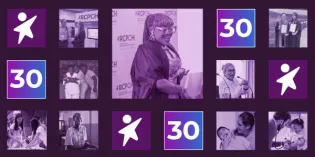
Listen to this episode below, or on Apple Podcasts, Spotify or wherever you listen to your podcasts. The RCPCH Learning page for 'Leading the way' hosts all episodes, along with the transcript and more leadership resources.
Here are Jonathan's thoughts from the episode.
1. Serendipity or strategy? Recognising opportunity
Simon shared several moments that seemed serendipitous—unexpected opportunities that shaped his leadership journey. But are these truly random? Or do they arise because we’re already doing meaningful work with passion and excellence?
When we commit to doing our current roles well, people notice. They see our dedication and come to us with new ideas or challenges. The key is to be ready—to recognise these moments and have the courage to say “yes.” Simon did just that, and it led to further growth.
But leadership isn’t just about seizing opportunities—it’s also about creating them for others. Who around you could benefit from a nudge, a suggestion or a chance to step up? Let’s be intentional about offering those serendipitous moments to others.
2. The smile factor: leading with passion
One of Simon’s most powerful messages was about the “smile on your face.” Leadership should energise us. It should align with our strengths and passions. When we’re doing work that matters to us, it shows—and it’s contagious.
Ask yourself: What gets you out of bed with a smile? What roles make you feel truly present and alive? That’s where your leadership potential lies. Passion isn’t just a personal motivator—it’s a leadership tool that inspires those around us.
The foundations of good leadership
Simon reminded us that good leadership starts with doing the basics well. Clinical credibility, reliability, and a desire to make things better—these are the cornerstones. When we lead with integrity and competence, we earn the respect that makes leadership possible.
He also drew a helpful distinction: leadership is doing the right thing; management is doing the thing right. Both matter. And both can be learned by observing and reflecting on the leaders who inspire us.
4. Surviving and thriving: the leader’s balance
Leadership can be demanding. Simon spoke about the importance of having a life outside work—activities and relationships that ground us. For him, early starts and walking to work provided space to reflect. For others, it might be family time, creative pursuits or simply switching off.
Boundaries matter. Knowing when to say “I’m done for the day” is not a weakness—it’s a strength. It’s how we sustain ourselves for the long haul.
5. Building and nurturing teams
Perhaps the most resonant part of our conversation was about teams. Simon is clearly intentional about building the right team—people with the right skills, the right size and the right chemistry.
He invests in their growth, celebrates their successes and plans for the future. Succession planning isn’t an afterthought—it’s part of the role. Great leaders don’t just lead; they develop other leaders.
6. Leadership is for everyone!
Simon’s closing message was simple and powerful: leadership is for everyone. Get involved in what excites you. Say yes to opportunities. And just as importantly, create opportunities for others.
Leadership isn’t about titles—it’s about action, passion, and impact. So, what fires you up? What’s your next step? And who can you lift up along the way?
Thanks for joining us for this first episode in the series. We look forward to sharing more leadership journeys with you soon.
Dr Simon Broughton is RCPCH Officer for Recruitment and General Paediatrician at King's College Hospital. Dr Jonathan Darling is RCPCH Vice President for Education and Professional Development.








